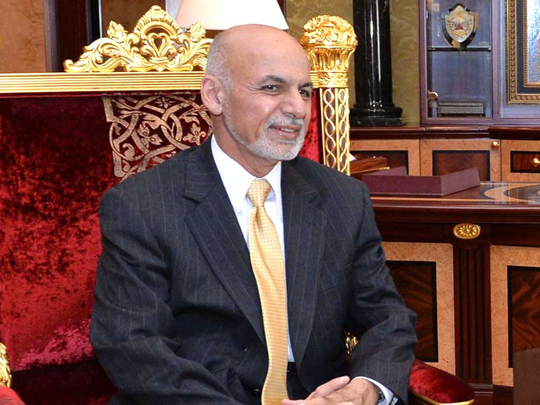
Dubai: Afghan President Ashraf Ghani's visit to Pakistan on Thursday is expected to ease tension between the two countries.
President Ghani had earlier sought to improve ties with Islamabad, but they remained tense, with the two countries accusing each other of allowing militants to shelter in their border regions and launch attacks in their countries
President Ghani, accompanied by a high-level delegation including ministers, advisors, senior officials and businessmen is visiting Pakistan on June 27 on the invitation of Pakistan Prime Minister Imran Khan.
This will be his first visit after Imran Khan became the prime minister of Pakistan. The high level visit comes as efforts have intensified to reach a political settlement with the Taliban and end decades of war in Afghanistan, which has long accused Pakistan of supporting the Islamist insurgent movement. Pakistan early this week hosted Afghan opposition leaders to discuss ways to peace and end an 18-year-long war in Afghanistan.
"President Ghani’s visit to Islamabad will improve ties between Pakistan and Afghanistan and will begin a new era between the two neighbors," Pakistan’s Foreign Minister Shah Mahmood Qureshi told reporters Islamabad during an Afghan peace conference.
During his two-day visit, Pakistan President Dr Arif Alvi will have a meeting with President Ghani while Prime Minister Imran Khan will hold delegation-level talks, according to APP.
Pakistan’s foreign ministry said the visit would focus on boosting cooperation in areas from security and peace and reconciliation to trade and the economy, adding that officials and a business delegation would accompany President Ghani
“The wide-ranging talks between the two sides would focus on strengthening bilateral cooperation in diverse areas - including political, trade, economic, security, peace and reconciliation, education and people-to-people exchanges,” according to a press release by the Pakistan Foreign on Wednesday.
President Ghani will also travel to Lahore where he will participate in a business forum to be attended by business representatives from both countries. “The people of Pakistan and Afghanistan are bound by fraternal ties reinforced by historical, religious, linguistic and cultural affinitie, the Foreign Office statement reads.
“Closer engagement between the leaders will help foster a stronger and multi-faceted relationship between Pakistan and Afghanistan,” it added. It will be President Ghani’s third visit to Pakistan which follows the recently held first review session of the landmark Afghanistan-Pakistan Action Plan for Peace and Solidarity (APAPPS). Other important bilateral exchanges in recent weeks included the telephonic call between President Ghani and Prime Minister Imran Khan, bilateral meeting between the two leaders on the sidelines of OIC Summit in Makkah, and visits of Afghan National Security Adviser and minister for Refugees to Pakistan.
President Ghani had earlier undertaken a bilateral visit to Pakistan in November 2014 and subsequently, came to attend the Heart of Asia - Istanbul Process (HoA) Ministerial Conference in Islamabad in December 2015.
“It is important to see how much regional countries, such as Pakistan, is ready and what kind of help it can provide for peace in Afghanistan,” said Haroon Chakhansuri, a spokesman for Ghani in Kabul, the capital as reported by Reuters
Taliban and U.S. officials have held several rounds of talks and say they are close to agreeing a timeline for the withdrawal of foreign troops and guarantees that Afghanistan would not be used as a base for militant attacks on U.S. targets.
But Ghani’s government has been shut out of negotiations by the Taliban’s refusal to deal with what they consider an illegitimate “puppet” regime.
Ghani this year accused Pakistan of meddling in internal politics, saying the keys to the war are in the cities of Islamabad and Rawalpindi, where its government and military are based, and Quetta, location of a key group of Taliban leaders.
Pakistani officials deny supporting the Taliban and say Islamabad strongly favors a political settlement to maintain stability in Afghanistan, but Afghan officials remain cautious.
Pakistan’s role in the peace talks is delicate, as it seeks to avoid demonstrating the kind of broad influence over the Taliban long attributed to it by Washington.
U.S. special envoy for Afghanistan Zalmay Khalilzad, who is leading the push to broker a peace deal with the Afghan Taliban, has held several rounds of talks with Pakistani officials to smooth the way.
Last week, dozens of Afghan politicians and opposition leaders gathered in Pakistan to discuss ways to achieve peace.
Trade analysts said Afghanistan was a key export market and important hub with central Asia for Pakistan, which faces bleak economic headwinds, including a looming balance of payments crisis likely to be worsened by regional turmoil.
“At this stage Pakistan cannot afford to see Afghanistan slide into chaos when it has been running short of foreign exchange reserves,” said Mohammad Jamaluddin of the Pakistan Afghanistan Joint Chamber of Commerce.
Writer and political analyst Mohammad Ashiqullah Yaqub told Anadolu Agency that the two countries have a lot to gain from improving ties and overcoming the mistrust.
“Both sides should dispel mistrust and promote peace and development that will eventually benefit Kabul and Islamabad. And for Afghanistan, its immediate neighbor Pakistan is the first natural and sustainable option for trade and cooperation,” he said.
Pakistan on Saturday hosted a day-long Afghan peace conference ahead of Ghani’s visit to Islamabad. Qureshi said the visit by some 57 key Afghan leaders and Ghani's visit is a clear signal that Kabul and Islamabad are on the same page. He said his country supports the peace process in Afghanistan and wants to build good ties with its neighbours.








